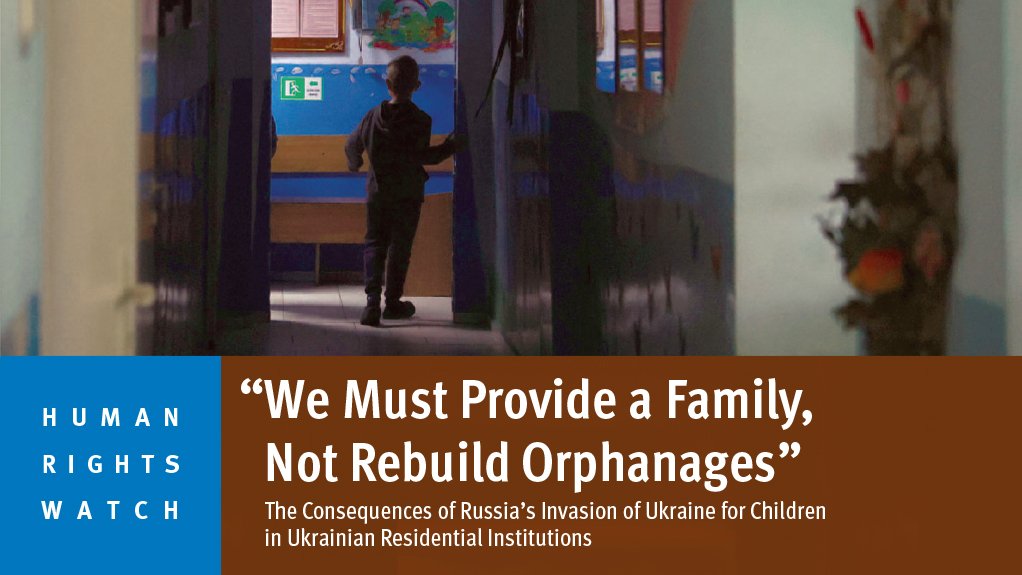- The Consequences of Russia’s Invasion of Ukraine for Children in Ukrainian Residential Institutions2.10 MB
Lviv, in western Ukraine, had largely been spared Russian attack until around 8:30 am on April 18, 2022, when four cruise missiles killed seven people. One missile hit a car tire factory a few hundred meters from a residential institution for children. The institution’s director said 27 children had lived there before Russia’s full-scale invasion of Ukraine on February 24, but that at the time of the attack there were an additional 50 children who had been evacuated from other residential institutions in eastern Ukraine, for safety. Some children were sleeping two to a bed.
Anton, 16, was from an institution in Lysychansk, a city in the Luhanska region. He slept through the air-raid sirens in Lviv that morning. “I woke up from an explosion and realized they were bombing because paint was falling from the ceiling,” Anton told Human Rights Watch. He and his friend Volodymyr, 16, ventured outside and found jagged, heavy metal remnants of the missile on the institution’s grounds, which they collected in a plastic bucket and later gave to Ukrainian war crimes prosecutors. One remnant flew through a kitchen window and landed between the cook’s feet.
Three caregivers accompanied the 22 children from Anton’s institution when they were evacuated to Lviv. The three women had been working for months without a break and were distraught about the lives and safety of family members left behind, and their own future. “We’re exhausted, and we don’t know what happens next,” said Irina. “Our institution [in Lysychansk] was bombed two days after we left. We were sheltering in the hospital at the time, and it was hit later. My home was destroyed.”
This report documents the consequences of Russia’s 2022 war against Ukraine for children and staff who had been evacuated from institutions in areas of eastern Ukraine, at the front line of the war at the time, to a dozen institutions in the Lvivska region and three institutions in Łódź, Poland. The war meant many children in institutions had to shelter from bombardments in basements without electricity or running water, for weeks. A group of children from an institution in Mariupol did not speak for four days after they were evacuated to Lviv, in March 2022, apparently due to trauma, one volunteer said. Dozens of Ukrainian children’s institutions have been damaged or destroyed. Most were built before 1991, during the Soviet period, likely with materials containing asbestos, a carcinogen, which may have been released into the environment by attacks. Institutions that had housed tens of thousands of children are in areas which at time of writing are under Russian occupation or where hostilities are most intense. Human Rights Watch has documented Russia’s forcible transfer of children from Ukrainian residential institutions. In December 2022, a Russian official in charge of children’s rights stated in an interview that almost 400 Ukrainian children had been “adopted” by Russian families. Inter-country adoption is prohibited during armed conflict; the forcible transfer of civilians from occupied territory is a war crime.
The war adds to the urgency for Ukraine to implement promised reforms to its institutional care system for children, by expanding a system of family and community-based care. As Ukrainian officials have acknowledged, institutional systems are harmful to children. Studies from around the world have shown for decades that placing children in institutions deprives them of the chance to form stable emotional attachments and harms their cognitive development. The younger the child and the longer they remain in institutions, the worse the harms. The United Nations Committee on the Rights of Persons with Disabilities has called for universal deinstitutionalization of children and acceleration of deinstitutionalization plans including during armed conflict, and found that children placed in institutions are likely to develop impairments and that existing impairments are likely to be exacerbated.
Report by the Human Rights Watch
EMAIL THIS ARTICLE SAVE THIS ARTICLE ARTICLE ENQUIRY
To subscribe email subscriptions@creamermedia.co.za or click here
To advertise email advertising@creamermedia.co.za or click here











